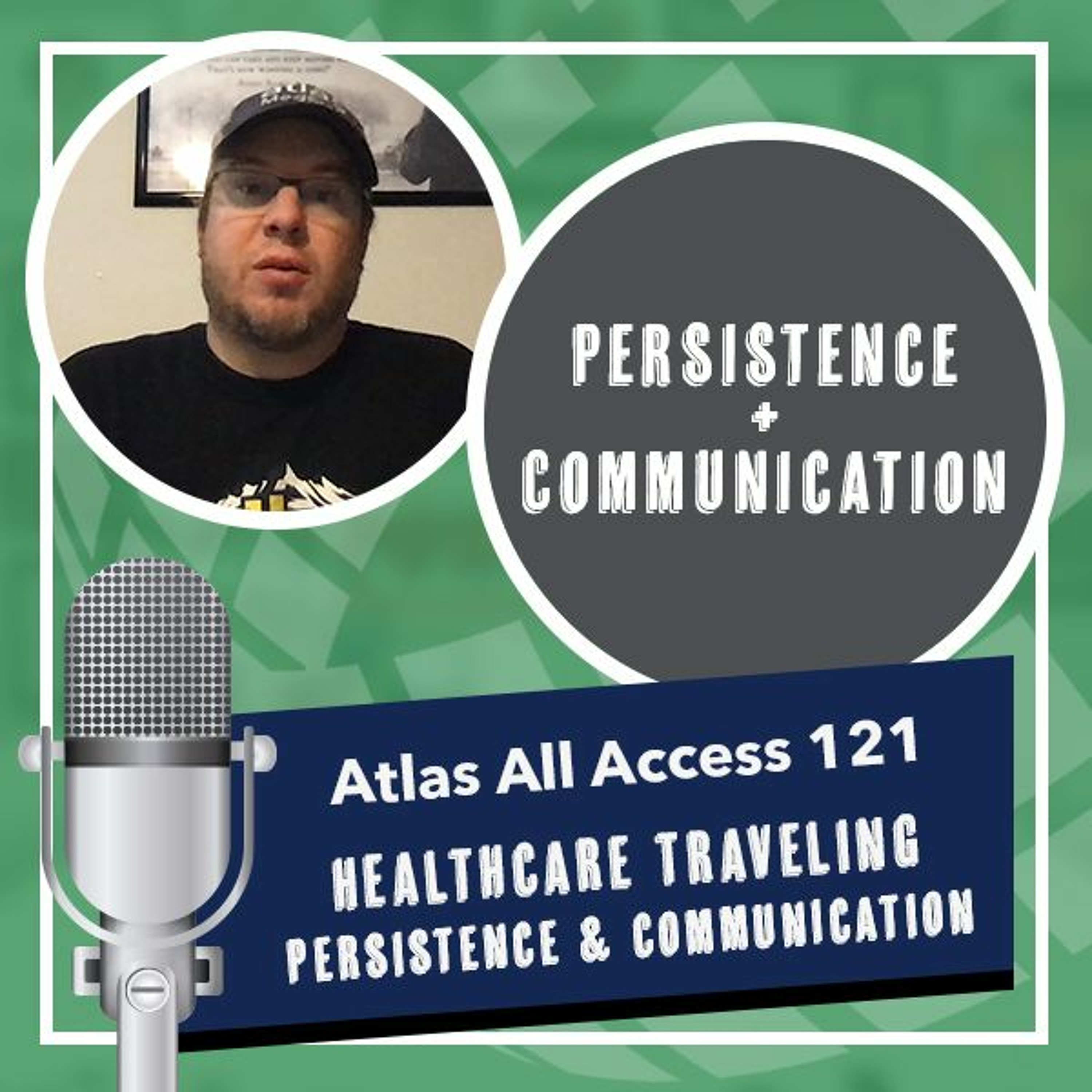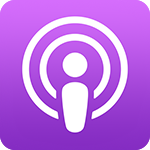
Persistence and communication during challenging times - Atlas All Access 121
06-12-2020
This week's episode comes directly from a question a listener sent in. (Obligatory: long-time listener, first-time caller.)
Is there anything you can do to increase the chances of getting that placement you are hoping for right now? And is traveling what I want to do right now?
Great questions! Tune in to find out some simple tips on how you can improve your odds of landing that next contract. (This is good for any traveler, not just our own Atlas family.)
Persistence and Communication.
Rich Smith: Well, back in the home office. Not that anything has changed at the Omaha office necessarily. We just kind of rotate through to make sure that we're all just trying to say stay safe, social distance is possible. Every Atlas recruiter and client manager is still working from their home, much like this. A poorly lit office, maybe. But hopefully, still working very hard for you.
Rich Smith: On this episode, I want to talk about an email that I received from an Atlas traveler in response to one our Atlas 411 videos that go out every week, just kind of that insider information, just questioning, I don't know, why they're traveling now and maybe asking for some advice on what to do and how to navigate the world that we're in. Atlas All Access: Home Edition, starts now.
Rich Smith: Okay, so I got an email the other day. Allied Health traveler sent me an email and asked a number of questions. All of them were good questions, but a lot of it was just kind of maybe questioning maybe why should we be doing it in the first place, should she keep doing it, and is it one of those things where is it just the time, or is it really something with your profile. So, I took some time to really think about it. I went back and looked at some of the jobs that she submitted to, and what I found was a couple of things. I'll start of the bottom of her email and kind of work my way up.
Rich Smith: What I found was there were probably a number of profiles submitted to this job. That is not uncommon right now. Every job right now is probably getting three times the number, five times in some cases, the number of profiles that they would normally get. You would think that maybe there would be some sort of system for this, where they would work through the ones with the most experience first, or whatever. Like they would have some sort of hierarchy and they would work through that. I can tell you that doesn't happen, because they're very busy at the hospital or wherever, whoever's going through those profiles first.
Rich Smith: It's not an excuse. It's just how it is. What they do is they'll just maybe take a handful of them, interview those, and then offer from what they got. The rest just sit there. So, is it anything that she did in particular? No. No, not at all. Was it anything that the recruiter did in particular? No. From what it looked like, the job opened and then rather quickly the profile was submitted. So, was it a matter of time? No. Could it have been that somebody else submitted, another agency submitted a candidate quicker? That's entirely possible. Could it be that maybe that candidate had worked there before? Highly likely that it happened.
Rich Smith: I kind of shared some of that information with her when I responded back to her email. Her second question was maybe a little more in depth, like is there anything she could do to her profile? She has a number of years experience. She's a veteran. Is there anything that she could do to her profile to really make it pop, to make it more attractive or appealing? I said, "Of course, absolutely." That's what we should be doing right now during these times, is working to make that profile more attractive so it does catch the eye of whoever's doing those interviews or sorting through them as they're going through their day.
Rich Smith: That's something that you'd want to work with your recruiter on though. It's persistence and communication. I think those are the two biggest things that maybe I want her to take away from that email response that I sent. Persistence and communication. Persistence, because there's so few jobs and so many profiles right now. Are you going to get the dream job that you want? No. No. Not right now. If you do, you're super lucky and that is awesome. But is it something that you can plan on? No. A year ago, maybe. It's entirely possible. Two years ago, sure. Why not?
Rich Smith: In some cases, it was fish in a barrel where you could go find those jobs and you'd get the job, and that's exactly what you were looking for. It's not like that right now. That isn't me saying you should take cruddy jobs or whatever. That's just a byproduct of the environment that we're in. Persistence, submit, submit submit. Let's get to as many places as you possibly can, go through those pay packages with your recruiter. You're not bothering them. You're not keeping them on the phone. This is their job. This is what they do. This is what they want to do for you.
Rich Smith: Then, communication. Talking to your recruiter consistently. Does it have to be everyday? No, not really. If you're looking for a job and it's getting down to the wire, maybe. I've got one right now, a very, very good friend of Atlas, who has been traveling for us for a long, long time, has been talking to her recruiter every single day because her contract's up in July and they aren't extending, and she needs something. She's a mother/baby nurse. Those jobs are very, very difficult to find right now. So, they're talking a lot. Virtually every day. Sometimes, just through text.
Rich Smith: However it works, the thought is communicate, communicate, communicate. Over-communicate. I can tell you right now your recruiter wants to have those conversations with you. They need to have those conversations with you right now in order to make sure that you're successful. It absolutely is part of the job. It's absolutely part of what they need to do in order to get you through these times that we're in right now. I talked about it a little bit, I talked about it a few weeks back. 2008, the financial crisis, was not all that different. The jobs just weren't there.
Rich Smith: We made it through just fine. On the other side, we came out and the industry exploded. We saw almost an Renaissance of sorts, a Golden Age of travel for traveling healthcare professionals. Are we going to come out of this? Absolutely. I have no doubt whatsoever. Are there going to be just a ton of jobs in awesome areas? Yeah, I can't tell you when. But it happened before. It can happen again. I wish I had a crystal ball. I wish I could... When are the jobs coming back? I don't know. I really don't. But what I can tell you is I've seen this before. It's a cycle like everything else. Those jobs will come back.
Rich Smith: I absolutely appreciated getting the email from her, and being able to sit down and respond one on one. I've said it before, I love talking to every one of our traveling healthcare professionals that either works for us, could work for us, out there on the road, happy with the company that they're with. There's always something to learn, and I learned just a little bit from this one too. I figured, there's ways that we can get better here. There's ways that we can grow. I would welcome those emails, welcome that. Send them to me. They'll put my email address... Well, you mean, you know it, rsmith@atlasmedstaff.com.
Rich Smith: If you don't want to email, you can message on Facebook. I'm always there, always, always, always. Maybe too much, quite honestly. I'm always there to talk, especially if you have questions, industry questions in particular. Now, your recruiter is your first line of defense, right? I can't find you a job. They know way better than I do maybe what you're looking for, but thoughts of the industry or just in general, this is why I'm here. I am happy to help.
Rich Smith: One of my favorite movie characters, Rocky Balboa, said, "It's not how hard you get hit, it's how hard you can get hit and keep moving forward." That's how winning is done. We're getting hit right now. Let's keep moving forward, and I guarantee that's how winning is done. We'll see you next week.



